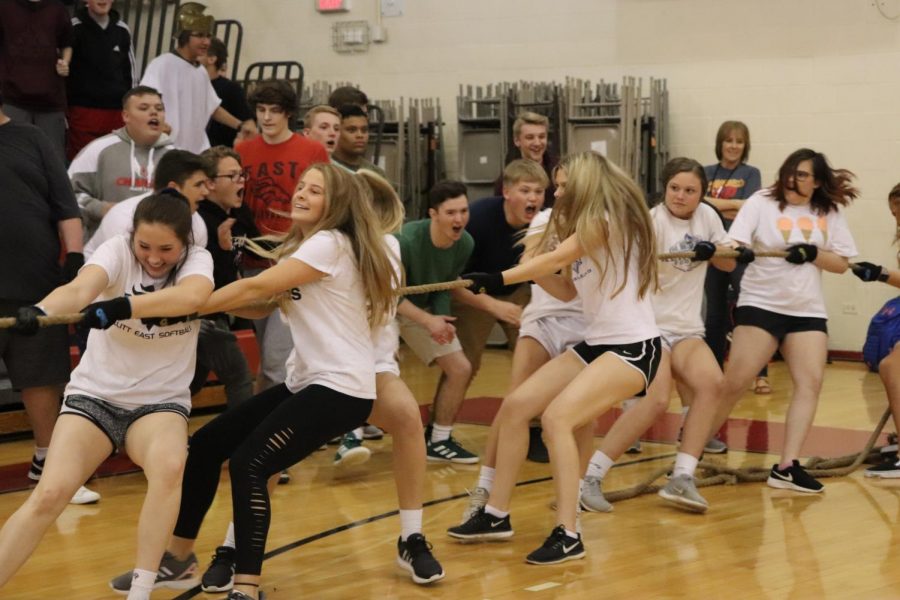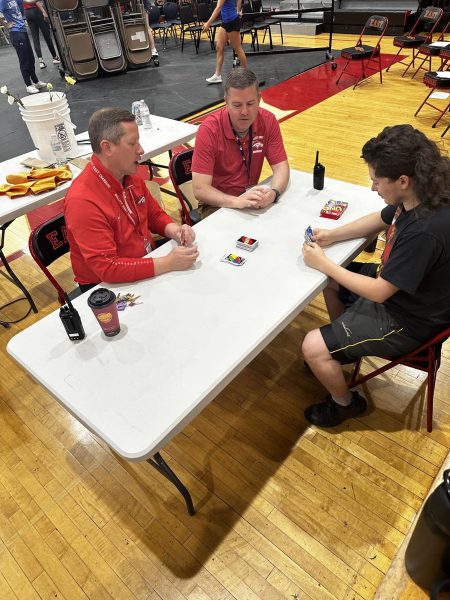Greek Games Emphasizes Teenage Priorities
Members of one of the sophomore girls teams for tug-of-war express their determination to win this competition while students cheer them on from the side during the annual Greek Games on May 2. The tug-of-war competitions comprised much of the time devoted to activities that the Games featured, in which students utilized their aggressiveness to try to assert their dominance over other grade levels, while many students inversely chose not to participate to avoid being subordinated for the same reasons. “Freshmen are new and want to save face. Sophomores and juniors are jaded and want to keep their image. They tend to hold themselves in high regard and don’t want to embarrass themselves,” said band teacher Trevor Ervin.
Social phenomenons may have changed, but human forms of entertainment haven’t.
Finding entertainment in watching others compete in organized games has prevailed since ancient times as it is a part of human nature, yet the shift in how participants are chosen from ancient to modern times has revealed a never previously seen commonality of people idolizing their reputation above all else.
In addition to all the activities meant to mimic the Greek Olympic games, the annual Greek Games assembly featured the kissing of a pig as well as the recognition of a few members of the school. The amount of people who participated communicates a lot about not only the organization of the event but the priorities that appear to be prevalent within each grade and the time of year with which it is held. It also indicates what changes to the event would have made students more encouraged to participate and what could make it more appealing for students in the upcoming years.
This year’s Greek Games consisted of a limbo challenge; a tug-of-war; a simultaneous three-legged race, egg race and hula hoop pass; a football toss and a balloon tag. Males and females from each House, or grade, were invited by their homeroom teachers to participate in these games against opposing Houses. The event started off with multiple victories by the freshmen and sophomores against juniors and seniors for both the boys and girls’ A teams, but progressively more seniors from the boys’ B team began to win against both juniors and freshmen.
After weeks of collecting money for the Kiss a Pig Fundraiser, in which money would be devoted to Relay for Life, the reward for collecting $500 was executed. All four principals: Nate Fulghum, Tim Ridley, Kari Stewart and Chris Mason followed by superintendent Jesse Bacon made their move of affection towards the pig to the entertainment of the student audience. Spanish teacher Brandi Molter acknowledged the fact that Sadie could now live a long life due to the money. Bookkeeper Theresa Williams, who often goes unnoticed for her financial work for the school, was then recognized with an award by Stewart. The upcoming retirement of math teacher Pam Cischke as well as the permanent impact she has made on the school was addressed by Spanish teacher Maddie Mann before she also recognized David Boyer for his constant optimism and compassion towards other students.
The low amount of students who were interested in participating in the event can be at least partially attributed to the theme of teenagers wanting to appear cool and superior by refusing to associate with organized events. Especially with an event that would require students to dress up in seemingly childish togas to do activities often present at an elementary field day, the idea of having any involvement with those kinds of activities likely repelled many students away from participating. Even if such attire and activities were merely implemented to establish the Greek theme, doing anything that they perceive as childlike or simply associated with something unrelated to their social life would supposedly make them appear lame, which wouldn’t bolster the reputation they’re trying to build throughout the school at all. Although this phenomenon is present beyond high school, students are especially concerned with their image at a time when they are developing their friend groups or are even fearful of being bullied for engaging in things that don’t adhere to the expectations of those groups. For seniors, however, the internal need to appear cool is a lot less of a concern as their having already established their reputation and friend groups means that participating in recreational events like that wouldn’t damage them at all. And with them graduating, many consider embracing events held by the school they’re about to leave more important than any negative perception that might be incurred by other students. It is especially prominent in freshmen, with whom many of them enter high school with the stigma that they will be bullied or judged by upperclassmen, so they avoid any potential sources of harm to their reputation that might make such actions a higher possibility for them. Band teacher Trevor Ervin, who tried to encourage his homeroom of sophomore students to participate in the event but only secured a couple of volunteers, recognizes that this low amount is likely due to that age group’s desire to maintain a respected status among their peers rather than the event itself being childish or embarrassing. “People in college dress in togas and do silly things. I think people at this age level in general want to be perceived as cool. If kids think something is not cool or won’t help their image then they aren’t going to do it,” said Ervin.
The event being hosted at the end of the year could be used as a source of entertainment in the midst of all that time period’s annual stresses being anticipated. With AP exams starting the following week as well as finals beginning a few weeks from then, many students would benefit from an event dominated by intendedly fun activities. “I think it’s really good for everyone to have a little break before we get hit with exams,” said sophomore Brynna Crump. However, for those very types of stressors having exhausted many students after months of being inflicted on them, students may have lacked the motivation to want to participate in such an event, even despite its supposedly fun nature. Therefore, the Games being held at a time not surrounded by upcoming or accumulated sources of stress would probably see much larger amounts of participants.
Crump, having preferred to watch the Games instead of participate in them, was discouraged from playing a more active role in them due to the Games being a competition between all four houses and therefore amassing an audience of the majority of the school. The activities of the Games are also largely geared towards more athletic students, so Crump did not view her more academically gifted self as suited for such an event. She was not concerned with the embarrassment in participating in such activities as being detrimental to her reputation so much as a general avoidance towards embarrassment. For students who are very shy especially, putting themselves in a position to be watched by the entire school is definitely not their ideal entertainment. Thus, Crump does not think the event in specific is an opportunity for students to take advantage of appearing cool but rather lacks activities that appeal to students with varying interests as well as its large audience. “I think a lot of us are too shy to get up in front of everyone or we just don’t have the interest in throwing a football. I don’t think people opt out to seem cool. It’s just because it’s not their niche,” said Crump. Ervin agrees with the event being too large and suggests the same activities being used as a means for competition between homerooms within houses rather than between Houses as a whole.
The Greek Games are intended to be a modern model of the ancient Greek Olympic games, hence why togas are prompted to be worn by participants. However, the only true similarity between the two events is the attire of their participants. To truly establish the school event as an emulation of its ancient origins, Crump thinks more Greek-styled games should be included in the event rather than relays, which are overall modernized. The event could feature a long distance race, wrestling, boxing and even a music-based competition with brass instruments to be accurately called The Greek Games. That way, too, the games would be more diverse to appeal to many types of interests rather than just athletic ones. “It feels kind of weird to call it the ‘Greek Games’ when the only Greek thing about it is wearing togas,” said Crump.





